Two new Sunderland HMOs refused planning permission over crime and design concerns
and live on Freeview channel 276
Plans to convert two buildings into houses in multiple occupation (HMOs) on Wearside have been refused over design and crime concerns.
Sunderland City Council’s planning department has blocked an application for 37 and 38 Toward Road in the city’s Hendon ward.
Advertisement
Hide AdAdvertisement
Hide Ad

Those behind the scheme said the large buildings had been rented in the past but had since fallen into a “poor state of repair”.
As the properties sit within an area of Sunderland where full planning permission is required for HMOs, applicant Aidan Property Ltd aimed to secure approval for the change of use.
A planning statement submitted with the application last year added the intention was to rent out rooms to the “professional market” as the properties have close links to transport and the city centre.
Advertisement
Hide AdAdvertisement
Hide AdDuring a council consultation exercise on the plans, Northumbria Police raised concerns about the wider links between crime and disorder and HMOs and the Toward Road development proposing “overambitious residency levels”.
Despite receiving a property management statement from the applicant, a council report stated the police were “not convinced” that the statement had “addressed all of their concerns”.
A number of public representations were also received raising concerns about the HMO use, noise, antisocial behaviour and parking.
After considering the planning application and assessing it against planning policies, Sunderland City Council’s planning department refused it on January 16, 2024.
Advertisement
Hide AdAdvertisement
Hide AdThe main reasons for refusal, outlined in a council decision report, included the standard of the proposed accommodation, particularly the “very limited shared internal amenity space” for the properties.
Concerns were also raised about one second-floor bedroom offering “inadequate” amenity space and outlook, as well as the “poor energy efficiency of the subject property”.
The second reason for refusal included concerns about the “amenity of the locality and local community cohesion”.
Council planners said this was due to the “absence of an acceptable management strategy for the premises, the intensity of the proposed use of the buildings and existing crime and disorder issues in the area, as evidenced by consultation comments from Northumbria Police”.
Advertisement
Hide AdAdvertisement
Hide AdThe council decision report added: “The management plan submitted to support the application does not appear specific to both properties.
“In line with the comments received by Northumbria Police, it is not considered [that there is] a robust management strategy which gives confidence that the accommodation would be satisfactorily managed.
“Northumbria Police also raise significant concerns regarding crime, anti-social behaviour and community cohesion in the area, which are linked to existing, poorly managed HMOs.
“Given the above, the proposed use is considered to constitute inappropriate development in the area, which would be detrimental to the living conditions of its future occupants, and the amenities of the occupiers of nearby properties, and would not meet the aim of creating places that are safe, inclusive and accessible, with a high standard of amenity for existing and future users; and where crime and disorder, and the fear of crime, do not undermine the quality of life or community cohesion and resilience”.
Advertisement
Hide AdAdvertisement
Hide AdSubmitted floor plans for the development showed six bedrooms at 37 Toward Road and seven bedrooms at 38 Toward Road.
Both buildings were proposed to contain one shared amenity space, with a kitchen/living room on the ground floor of each rear offshoot.
It was also noted that rooms had been designed to provide en-suite facilities “where possible” and that all bedrooms and shared facilities would exceed standards around room sizes.
Although it was noted that the vacant properties would “benefit from being brought back into use”, council planners said “concerns remain over the intensity of the proposed use”.
Advertisement
Hide AdAdvertisement
Hide AdConcerns were also raised about the building’s Energy Performance Certificate ‘E rating’ and the potential for fuel costs to be “passed onto occupiers of individual rooms”.
The council decision report continued: “Although the applicant stated that the proposal is intended for professionals this cannot be guaranteed or controlled and HMO properties of this size attract low-income earners or tenants that are on benefits.
“Whilst it is acknowledged that there are no direct requirements to bring a property to modern day standards there is cause for concern for energy costs to be passed onto future occupiers of the proposed HMO, giving rise to fuel poverty issues given that occupiers of the HMO would most likely be individuals of low income.
“It was identified that the properties would benefit from being converted into self-contained flats as opposed to the proposed use of a HMO. In which the agent’s response was that it wouldn’t be financially viable”.
Advertisement
Hide AdAdvertisement
Hide AdThe applicant has the right to challenge the council’s refusal decision by lodging an appeal with the Secretary of State.
For more details on the planning application and council refusal, visit Sunderland City Council’s planning portal website and search reference: 23/00846/FUL